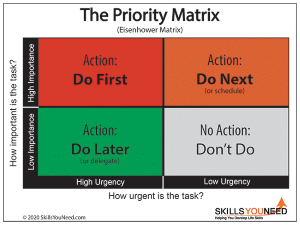Organisation
Organisation
As part of our You Can Do It program, during our last three assemblies, we have been focusing on what it means to be organised and how being organised aides and builds our personal capacity.
Techniques that we use to organise ourselves have a direct connection to the success of an educational journey. Being able to have the correct equipment, prioritise and plan ahead are all skills that allow students to ‘clear the clutter’ from their minds and engage more fully in processes that positively shape us.
By encouraging children to be organised and take an active interest in planning ahead, we are empowering our young people. We know that when students come to school, they are required to have their hats and jumpers and be organised. If they fail to meet these expectations, they quickly find out that they either aren’t allowed to play outside or are cold. These are the direct consequences of being unorganised and are valuable learning moments that connect responsibility and organisation.
 However, we can all agree that sometimes it is difficult to get children to be organised! Difficult, but not impossible. Dan Pink in the book ‘Drive: The Surprising Truth About What Motivates Us’, points out that by focussing on the benefits of the task rather than the task itself, we create an environment where we begin to see how our actions help make our lives easier. By focussing on the positives of being organised, we build a culture that facilitates a sense of achievement and increased personal capacity rather than the how or repetitiveness of what is to be required.
However, we can all agree that sometimes it is difficult to get children to be organised! Difficult, but not impossible. Dan Pink in the book ‘Drive: The Surprising Truth About What Motivates Us’, points out that by focussing on the benefits of the task rather than the task itself, we create an environment where we begin to see how our actions help make our lives easier. By focussing on the positives of being organised, we build a culture that facilitates a sense of achievement and increased personal capacity rather than the how or repetitiveness of what is to be required.
Another simple way of aiding organisation is by using the priority matrix. This simple organiser provides a common ‘language’ when children are faced with numerous tasks and don’t know where to start. This is especially helpful for time management. It may prove useful to print and place in a prominent position for those busy mornings before school!
Forgiveness
When resolving conflicts and breakdown in relationships, children will often bring up issues that they feel have remained unresolved. At assemblies, we have also been focussing on what it means to forgive. A wise Year 2 student suggested that by not forgiving others we put down an anchor that doesn’t allow us to move forward. At the crux of forgiveness between children and adults is the sincerity of the apology. We continue to discuss what an acceptable apology means and how it allows us to move forward. Elements of a purposeful apology are:
- If harm has occurred, tell them how your actions have made them feel.
- Admit your mistake and how it has affected them.
- Make the situation right by words and actions.
In the middle of the word ‘forgiveness’ is ‘give’. To move forward, we all need to give in some form or another. Whether it be by owning up to our mistakes or by accepting an apology from someone who has made an error in judgement. By giving, we haul up our anchor and move toward the horizon.
Athletics and SCISSA
With our inter-house athletics carnivals completed for the year, I would like to take the opportunity to thank Mr Darren Hooper and Mrs Natalie Campbell who work tirelessly behind the scenes to make these events a success. I would also like to thank our wider College community for their cooperation in adhering to the restrictions in our COVID safe plans. Your support is very much appreciated. We look forward to welcoming parents and guardians back to events like these when the current restrictions ease.
Today, our Year 4-6 students participated in their SCISSA Gala Day for Term 3. Well done to all students who represented Pacific.
Take care and God bless.
Mr Damian Davis, Head of Staff and Students P-5
